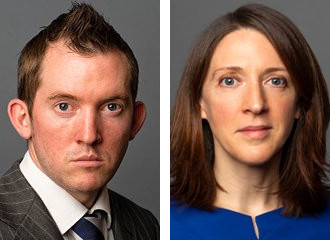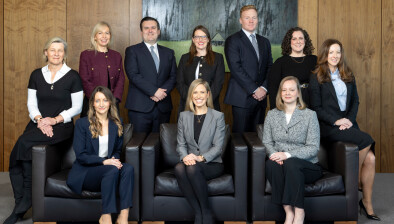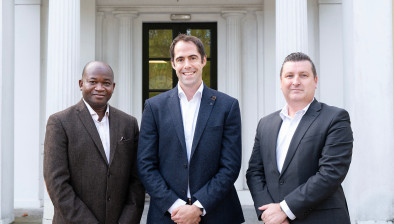Analysis: High Court pierces corporate veil

Garreth O'Brien and Heather McMahon
McCann FitzGerald partner Garreth O’Brien and senior associate Heather McMahon consider a significant High Court decision on company law.
For the first time, the High Court has pierced the corporate veil to make directors and shadow directors personally liable for the fraud of a company.
In the case of Powers v Greymountain Management Ltd (In Liquidation) [2022] IEHC 599, the defendant, an Irish registered company, was a key middleman in a chain of payments which allegedly defrauded members of the public, primarily based in the US, out of many millions of euro. The plaintiff and other investors believed that they were trading in binary options. However, these were never purchased and instead the money was converted to the use of the defendant’s shadow directors and others.
It was alleged that payments were channelled through the company to give a “veneer of legitimacy” to the fraudulent scheme, as investors believed that their funds were safe with a company regulated in Ireland. This status also facilitated the receipt of credit card payments from the investors.
No order was sought against the company, which was now insolvent. Instead, the plaintiff sought orders against the company’s Irish directors and foreign shadow directors making them personally liable for the funds that had been lost in the alleged fraud. However, no Irish court had ever pierced the veil of incorporation in this way and the issue for the court was whether it should do so now.
Piercing the corporate veil
Twomey J concluded that the sole purpose of the company was as an instrument of fraud and that the moral responsibility here lay with the shadow directors.
Nevertheless, as regards legal responsibility, it was a well-established principle of company law, that a company had a separate legal personality to its members and so, except in exceptional cases, the directors and shadow directors would not be liable for the actions of a company.
However, having reviewed relevant case law, he said that the Irish courts would contemplate piercing the corporate veil, if it was a case of:
- fraud or the misapplication of monies or misrepresentation by the directors, or
- the directors syphoning off large sums of money out of the company so as to leave it unable to fulfil its obligations, or
- negligence or impropriety by the directors in the conduct of the affairs of the company,
provided that the facts were established in a plenary hearing and not merely on affidavit, and that the parties charged had the opportunity to know the full extent of the case against them and a proper opportunity to defend themselves. He was satisfied these safeguards had been followed in this case.
Finally, the interests of justice should also demand the piercing of the corporate veil.
Personal liability of shadow directors
Twomey J next looked at whether the court would be justified in affixing the shadow directors with personal liability for the loss caused to the plaintiff by the company.
He saw no reason in principle to distinguish between shadow directors and directors when deciding whether the corporate veil should be pierced. Here the shadow directors syphoned off the company’s funds leaving it unable to discharge its liabilities to the plaintiff. Given their moral responsibility for the fraud, he found them personally liable to the plaintiff for his losses. He said that while the court was not piercing the corporate veil lightly and was not suggesting that this would be a regular occurrence, it would be an affront to justice to allow these shadow directors to hide behind the company’s separate legal personality.
Role of Irish directors
Twomey J then turned to look at the Irish directors of the company. He could not conclude that they were aware of the fraud, its extent or that they directly benefitted from it. Instead, it seemed that they were unwittingly involved in facilitating the fraud, by becoming directors of an Irish company.
He said that their acts and omissions were of a completely different character in that they abrogated their duties as directors to the shadow directors, who then used their position to defraud investors.
Twomey J distinguished between the directors’ differing roles. He did not accept that the first director had a purely administrative role in the company akin to a company secretary. Instead, he found that this director had an active role in the company’s operations, including signing payment-processing agreements on its behalf. This facilitated the fraud. He was a co-signatory on the company’s bank account and prepared and filed CRO documentation, including the company’s audited accounts. Yet, even though $186 million went through the company, that director chose not to discharge his duty as a director to acquire a sufficient knowledge of the company’s business to enable him discharge that duty. If he had done so, it was possible that the fraud might have been detected earlier. In addition, there was no evidence that he discharged his duty as a director to investigate allegations of irregularities involving the company, which came to his attention. He also reassured An Garda Síochána when they enquired about the company’s activities.
In contrast, the second director was a student and had no role in the company. He said that he had been a director in name only, as its owners “needed a local person”. He took the role to pay his college expenses. Twomey J also found that this director did not acquire a sufficient knowledge of company’s business to enable him to properly discharge his duties as a director. He also abrogated entirely the running of the company to the shadow directors, with a total lack of oversight of what the company was doing.
In particular, Twomey J pointed to the fact that both directors had signed a power of attorney in favour of one shadow director on the basis that they were nominee directors and he was the actual owner of the company. This was described as “standard practice” and permitted under the Companies Acts. This facilitated the fraud.
Twomey J acknowledged this practice but said that the fact that a director was legally empowered to grant a power of attorney to a third party did not mean that it was appropriate for that to be done in a particular case. Furthermore, it was not a defence, where in addition to granting the power of attorney, both directors did not oversee, to any degree, the purpose for which the power of attorney was used.
Conclusions on directors’ failures
Twomey J concluded that it was likely that the fraud, using an Irish company in this manner, would not have occurred without the assistance (albeit unwitting) of Irish residents willing to act as directors and be paid for so doing and who took no steps to find out what the company was actually doing. This assistance was provided by the directors here because they failed to observe the basic duties of a director, as they failed to:
- inform themselves about the nature of their duties as director (or if they did, they ignored those duties);
- acquaint themselves with the affairs generally of the company, and
- exercise appropriate supervision or oversight at a board level in respect of the execution or discharge of whatever tasks or functions had been properly and appropriately delegated to others.
Personal liability of Irish directors
Twomey J said that although he had some sympathy for them, the corporate veil should be pierced in respect of both directors.
He noted that the first director was a very experienced company director. In choosing not to acquire a sufficient knowledge of the company to enable him to discharge his duties as a director, he should have known that he was in clear breach of those duties, for which he was being paid. The extent of the dereliction of duty and the impropriety, whereby he handed over the running of a company without knowing whether it was being used for good or evil and not apparently caring, was such that it merited the corporate veil being pierced and him being made personally liable to the plaintiff.
Although, the second director was not morally responsible, he should legally face the consequences of what the company, of which he was a director, had done. He completely abrogated his duties as a director, which allowed a shadow director to use the company as an instrument of fraud, without any oversight. While he may not have appreciated that he was breaching his duty as a director here, ignorance of the law was not a defence. The complete and total disregard of his duties as a director was of an extreme nature, since he had no idea what the company was actually doing. It was also relevant that the dereliction of duty led not to an accidental or negligent loss to the plaintiff but instead a fraudulent loss. He had also indirectly benefitted from the fraud by way of his remuneration as director. He had to accept responsibility for his actions.
Comment
This case, with some recent other decisions of the Irish courts, is a further reminder that a person ought not become a director of an Irish company unless he or she is prepared to engage actively in the affairs of the company, understands their duties and acts at all times in the interest of the company. Failure to do so can result in the imposition of personal liability for certain liabilities of the company, as well as a court order preventing a person from acting as a director of an Irish company.
![]()
- Garreth O’Brien is a partner and Heather McMahon is a senior associate at McCann FitzGerald LLP.










